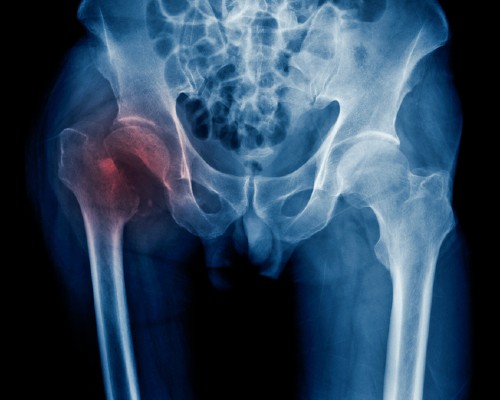How well patients recover after a hip fracture varies enormously between NHS hospitals in England and Wales and in some hospitals one in ten of patients died within a month of their fracture, a new study has found.
The research investigated how the ways NHS hospitals provide care to patients with a hip fracture influences how well patients recover after a hospital admission with the fracture.
Researchers used anonymous routinely collected hospital records from 178,757 older adults in England and Wales, who broke their hip between 2016 and 2019. They were interested to find out how hospital care might affect a patient’s chance of survival, how long patients needed to stay in hospital, and once home, how often patients needed to be readmitted to hospital because of a complication.
Each year more than 70,000 older adults are admitted to a UK hospital after a hip fracture, which can lead to a decline in quality of life, high mortality risk and, after discharge, high risk of emergency hospital readmission.
The team found that how well patients recovered after a hip fracture varied enormously between the 172 hospitals studied across England and Wales. In some hospitals one in ten of patients died within a month of their fracture, whilst in other hospitals the figure was less than half of this.
The time patients spent in hospital also varied widely. In some hospitals people with hip fractures stayed on average about 12 days, whilst in other hospitals this was more than a month. The chance of patients needing to come back into hospital after getting home was also very variable. In some hospitals the risk was low – about four in 100 people, whilst in others it was high – about 30 in 100 people needing to be readmitted to hospital.
Celia Gregson, Professor in Clinical Epidemiology in the Musculoskeletal Research Unit at the University of Bristol and chief investigator of the study, said: “Patients should be able to expect to receive the same, high-quality care if they break their hip, irrespective of where they live or which hospital they attend.
“The results of our study have shown multiple, important points in the pathway of patient care which hospitals can focus on to streamline and improve the quality of their hip fracture services and patient outcomes.”
In hospitals where staff were able to get at least 90% of their hip fracture patients out of bed promptly the day after surgery, patients stayed on average two days less than in hospitals that didn’t manage to mobilise their patients as well.
Deborah Alsina MBE, Chief Executive Officer of Versus Arthritis said:“This research highlights the worrying state of care for older people who break their hip. The findings show that older people have a high chance of dying in the weeks after breaking a hip, and that whether or not they survive varies enormously between NHS hospitals in England and Wales.
“Hip fractures mainly affect older people, many of whom live with multiple long-term conditions, and quality of care for people with hip fractures is a key indicator of whether we’re getting older people’s care right in general. This research suggests we are not.
“With a deepening NHS crisis, clinical care teams need all the support they can get to achieve consistent, sustainable and high-quality hip fracture care across the UK. The clinical tools being developed through this research will help the NHS achieve this.”







